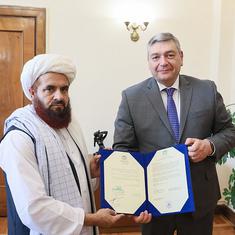SC asks Centre to submit detailed report on number of Rohingya refugees in Delhi, Haryana camps
The report has to be filed in four weeks and specify the basic amenities available in the camps.

The Supreme Court on Monday asked the Centre to file a comprehensive status report on the number of people living in three Rohingya camps in Delhi and Haryana and the basic amenties available to them, PTI reported. The Centre has four weeks to submit the report on the camps located in Mewat, Faridabad and Delhi.
The direction came on a petition filed by two Rohingya refugees claiming the government had denied them basic amenities, including toilets and drinking water. This, they said, led to cases of diarrohoea in the camps. Thousands of Rohingyas are living in India after fleeing what has been described as ethnic cleansing in their native Myanmar.
On March 18, the apex court had asked the Centre and various state governments to conduct “proper site visits” and file a comprehensive report on the conditions of Rohingya refugees in India. On March 19, the court had refused to grant interim relief to Rohingya refugees on matters related to health and education, agreeing with the Centre’s argument that it would impact India’s diplomatic ties with Myanmar and Bangladesh. The court asked for more evidence to counter the Centre’s claims, PTI reported.
The petioners, refugees Mohammad Salimullah and Mohammad Shaqir, have sought access to healthcare and education similar to those provided to Sri Lankan Tamil refugees in Tamil Nadu.
The bench headed by Chief Justice Dipak Misra scheduled the next hearing in the case for May 9.
Deportation
In August 2017, the government had announced that it was planning to deport all 40,000 Rohingya refugees living in the country. On September 18, 2017, the government told the Supreme Court in an affidavit that the continued illegal immigration of Rohingyas to India had “serious national security ramifications and threats”. It claimed that inputs from security agencies indicated that some of the refugees had links with terror groups in Pakistan.
The Centre’s plea was in response to a PIL filed by Salimullah and Shaqir, who said they had taken refuge in India after escaping discrimination, violence and bloodshed against their community in Myanmar.
On October 13, the court had said that no Rohingya refugee should be deported until it decided on the matter.









